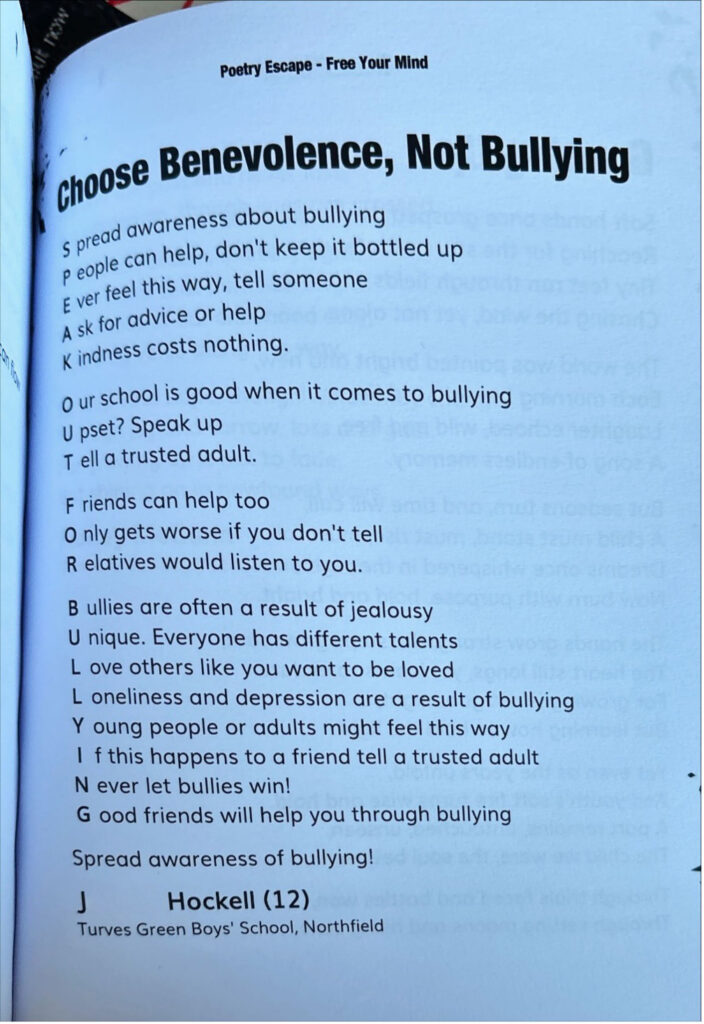Celebrating Student Voice: "Choose Benevolence, Not Bullying" by J. Hockell (Year 7)
We are incredibly proud to share a powerful and heartfelt poem titled "Choose Benevolence, Not Bullying", written by one of our dedicated Anti-Bullying Ambassadors, J Hockell from Year 7.
Joshua’s words reflect a deep understanding of the strength and kindness it takes to stand against bullying. Through his poem, he encourages all of us to choose compassion, empathy, and respect in our daily interactions. His message is a moving reminder that each of us has the power to make a difference.
At our school, we believe in amplifying student voices and creating a culture of kindness. His poem is a shining example of this, and we commend him for using his voice to raise awareness and inspire change.
Well done – we are truly proud of you for being a champion of kindness and a beacon of positivity in our school community.

In addition, our anti-bullying ambassadors have come together to create 10 points regarding signs of bullying for parents/carers to look out for.
10 Signs a Child Might Be Experiencing Bullying:
- Unexplained Injuries or Damage to Belongings
Frequent cuts, bruises, or damaged clothes and school supplies without a clear explanation may indicate physical bullying. - Reluctance to Go to School or Sudden Drop in Attendance
A child who regularly complains of feeling unwell, wants to stay home, or skips school may be trying to avoid a bullying situation. - Withdrawal or Sudden Changes in Behaviour
Becoming unusually quiet, anxious, or depressed, especially after school, can be a sign they are facing emotional distress from bullying. - Loss of Interest in Schoolwork or Drop in Academic Performance
Bullying can affect concentration, confidence, and motivation, leading to lower grades or disengagement in class. - Avoiding Social Situations or Loss of Friendships
If a child starts avoiding social events, stops spending time with friends, or becomes isolated, they may be experiencing social bullying or exclusion. - Changes in Eating or Sleeping Patterns
Difficulty sleeping, nightmares, or changes in appetite (eating too much or too little) can be signs of emotional stress from bullying. - Unexplained Headaches, Stomach Aches, or Frequent Illness
These physical symptoms are often stress-related and may signal that a child is under emotional strain. - Sudden Loss of Confidence or Low Self-Esteem
A previously confident child who becomes self-critical or withdrawn may be reacting to being targeted by others. - Secretive Use of Devices or Strong Reactions to Online Activity
Cyberbullying may lead to anxiety around phones or computers, secretive behaviour, or distress after using digital platforms. - Talk of Self-Harm, Running Away, or Feeling Hopeless
In severe cases, bullying can lead to dangerous thoughts or actions. Any talk of self-harm should be taken seriously and addressed immediately with professional support.
If you notice any combination of these signs, it’s important to approach the victim of bullying with care, listen without judgment, and involve appropriate support systems – including school staff and safeguarding team here at Turves Green (DSL- Mr Rogers or Miss Brooker). Early intervention can make a lasting difference.



